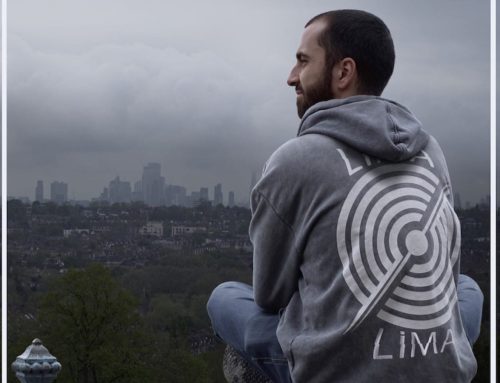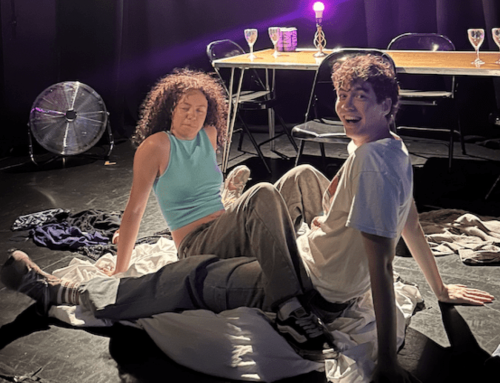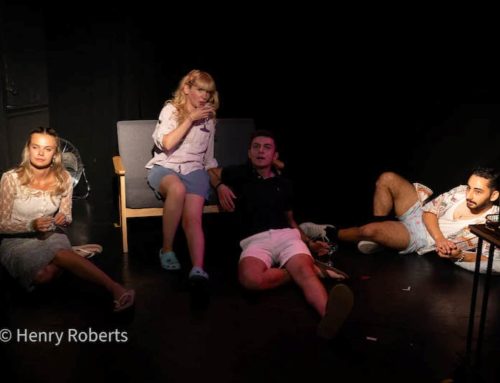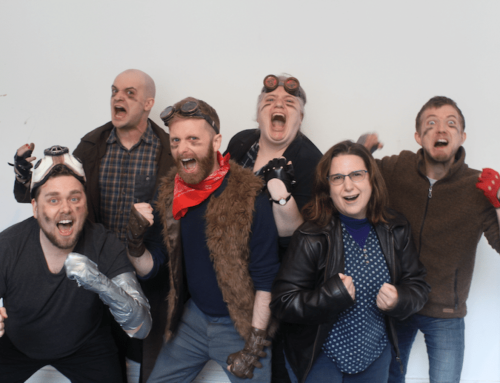The Grammar Of Witchcraft, penned by pastor, poet, and Christian anarchist David Parry and currently running the Etcetera Theatre, is a peculiar beast. Think a verse mash-up between Shakespeare’s The Tempest, ‘70s folk horror movie The Wicker Man, and a how-to guide to everyday witchcraft, all set to hard-to-decipher iambic pentameter and written from a radical ‘80s LGBT+ perspective. It is the theatrical equivalent of pâté de foie gras: dense (rich even), provocative in its ingredients, not to everyone’s taste, and probably best enjoyed only occasionally. However, as one of the characters tells us “only misfit minds descend to true chaos,” so if you are of that mindset, jump on in.
Though briskly entertaining in its way, quite what happens in the show is hard to decipher (fear not, the cast do not seem to have much idea what is going on either). What follows is, therefore, a stab at making sense of it based partly on the promotional blurb. Caliban (Thomas Witcomb), the savage, surly, contorted creature from The Tempest has a dreadful hangover. Given the surreal and bizarre nature of unfolding events he may have been consuming substances a little more psychoactive than a bottle of sauternes. The blurb tells us that Caliban is trans, but the show casting is entirely gender blind and the black-clad actors often wear white masks, so this adds little to the story. He finds himself transported by a depressed, chanting taxi-driver to a wedding in Liverpool. This is conducted at ‘St Breeder’s’ Church by a mother-earth type character dressed as a kind of maypole.
At the wedding reception Caliban dons a headdress of red and yellow roses and flirts with a waiter (who among us could resist his invitation to “follow me to the holly hedges”) to whom he explains the significance of various types of trees in the practice of witchcraft. At this point one of the brides dons a plastic phallus and simulates sex with her wife. The waiter says, “I am lying on the ground because I am short” and there is a musing on the importance of LGBT+ inclusivity in the church. We then, somehow, end up back in London at which juncture a character says, “light at last has darkly dawned” and the show closes. You get the idea.
At various points in The Grammar Of Witchcraft there is quite a lot of jerky writhing happening, which could be dancing, set to music that ranges from Jazzy easy listening to heavy rock, by way of Celtic style Appalachian fiddle tunes. This is the most comprehensible part of the 50-minute show. Theatre-land is richer for this kind of event, but once a year is probably enough.
Writer: David William Parry
Director: Victor Sobchak

More Recent Reviews
Playfight. Soho Theatre.
Writer Julia Grogan’s breathtakingly assured debut play arrives at Soho Theatre following stellar reviews at the Edinburgh Fringe and [...]
All The Happy Things. Soho Theatre.
Naomi Denny’s three-hander comedy-drama All The Happy Things covers familiar themes within a recognisable premise. A grieving protagonist comes [...]
Telly. Bread and Roses Theatre.
The challenge with absurdist comedy is that many people do not find it funny. Laughing at the sheer weirdness [...]





